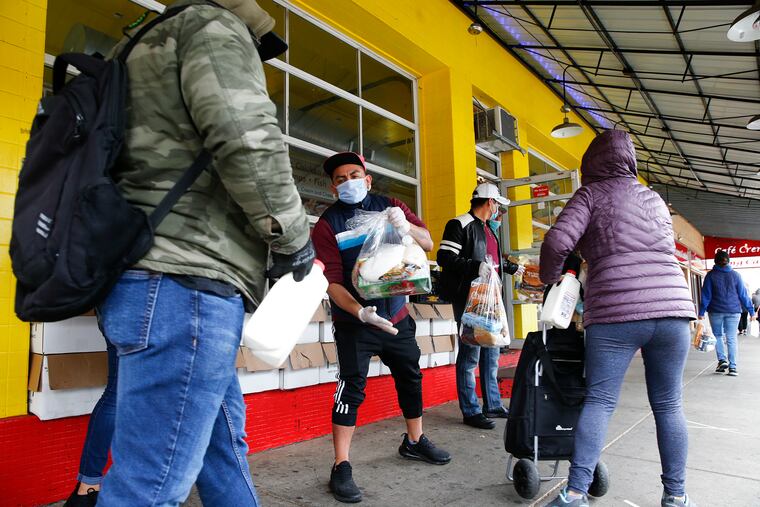When the rent is due, South Philly restaurant owners donate food to meet the cooking needs of Latino families
Organizers packed 350 despensas with rice, beans, milk, eggs, flour tortillas, hot peppers, and soups for Latino families in South Philly, to help them with food supplies when the rent is due.

About 30 minutes before the food distribution started, the crowd had already formed at the corner of Ninth and Federal Streets at the Capitolio Playground in South Philadelphia. Hundreds of men, women, and children stood in line, observing social distancing requirements, one day before their rent payments were due. Some were pushing strollers or grocery carts. The adults wore face masks to prevent the coronavirus and hoodies to hide their shame of seeking free food.
Two volunteers reviewed the addresses on the utility bills the recipients were required to bring, verifying they lived in South Philadelphia. Standing in the middle of Ninth Street, restaurant owner Ignacio Marcelo Flores directed the crowd to his restaurant, Los Taquitos de Puebla III, where they would pick up a large, clear plastic bag filled with food.
Among the recipients was a 35-year-old woman from Guerrero, Mexico, who lives on Dickinson Street. She didn’t want to be identified because she said she was ashamed to seek food for her three children ages 9, 8, and 3. She and her husband both lost their jobs three weeks ago. She is a housekeeper, her husband a chef.
“My husband and I are grateful that we are home with our kids and not being exposed to this virus, but we don’t have enough savings to pay the rent of May and buy our groceries,” she said.
The food distribution last week was an effort to make certain that the Latino community did not have to make a choice at the end of the month — rent or food?
Seven Latino restaurant owners in South Philly, along with neighborhood residents and two businesses, collaborated to distribute 350 bags of food. The food packs, commonly called despensa — Spanish for pantry, and the word that most Mexican and Central American Latinos use to refer to the purchase of food — included items to meet the food choices and cooking practices that these Latino families use at home. The packs were filled with rice, beans, milk, eggs, flour tortillas, hot peppers, and soups. The goal was to provide enough food to feed a large family for two weeks.
The community effort, a day before the May 1 rent was due, took place as the United States experienced lengthy lines in food banks around the country, as a result of the economic impact of the pandemic.
» READ MORE: The meat shortage affects more than just supermarkets. Here’s why.
The South Philly despensa project began after the owners of Tamalex on Federal and Seventh Streets decided to close the family-run restaurant until the economy improves. Tamalex put together 150 food packs filled with its produce for local residents to pick up April 23. The need was great and the Tamalex owners fell short by almost 200.
This experience spurred the family, community journalists, and local volunteers to organize a larger food distribution effort to meet residents’ needs as they struggle to pay bills. They hope to continue the program.
“It was devastating to see that our community was in such need [for food]. Something had to be done, and we did this with all our hearts,” Tamalex owner David Piña said of the April 23 distribution.
The next day, the larger collective was formed. At South Philly’s Los Taquitos de Puebla III, 322 despensas were distributed in about 30 minutes last week to families primarily from Mexico, Honduras, El Salvador, and Nicaragua.
Édgar Ramírez, a community journalist and the founder of Philatinos Radio, served as the liaison between the people in need and the organizers. He said residents and community members said they didn’t know how to prepare meals from the food boxes being offered at the city’s larger food distribution sites.
“Our community already feels disenfranchised with all these stimulus and loans that weren’t built with us in mind,” Ramírez said. “To have our own struggling to prepare canned goods when we know what is practical for them, for our large families, it’s not solidarity, it’s our responsibility.”
Ramírez suggested that Philadelphia officials must recognize that the grassroots work needed in these Latino communities isn’t always pursued by the established nonprofit organizations or the consulates in Philadelphia for each country.
Heather Keafer, chief of communications and strategies for the city’s Office of Children and Families, said that during the pandemic, 32,000 food boxes are being distributed every week (175,629 boxes to date) at the 40 food sites supported by the city, packed with nutritious food — shelf-stable items on Mondays and fruits and vegetables on Thursdays.
“Through this effort, we are providing food to all communities. We’re also grateful to everyone who has stepped up to donate their time and energy to help out at this time. The need is great and it’s true that working together we can do more to help our neighbors in need,” she said in a statement via email.
» READ MORE: Philly’s farmers markets roll with the punches during a pandemic
In South Philly, the restaurant owners and volunteers have already started another drive for a second despensa distribution. The date will be determined by need, volunteers, and donations.
“It’s very satisfying for all of us to serve our people when they need us most,” said Piña.